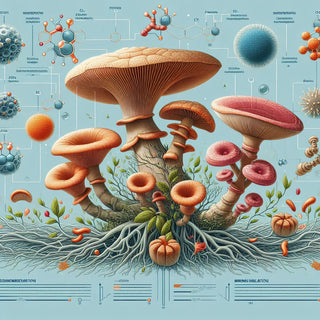In the realm of natural remedies, medicinal mushrooms have emerged as potent allies in promoting health and well-being. Their centuries-old use in traditional medicine systems has paved the way for modern scientific exploration into their therapeutic properties, particularly in immune modulation. This comprehensive guide delves into the fascinating world of medicinal mushrooms, exploring their diverse health benefits and the role they play in supporting immune function.
Overview of Medicinal Mushrooms
Medicinal mushrooms encompass a vast array of fungal species known for their therapeutic properties. From the majestic Reishi to the humble Shiitake, these mushrooms contain bioactive compounds that contribute to their medicinal properties. While each mushroom has its unique composition, they all share a common goal: to promote health and wellbeing.
Medicinal mushrooms are rich in polysaccharides, terpenoids, antioxidants, and other bioactive compounds that contribute to their health-promoting effects. These compounds interact with various systems in the body, including the immune system, nervous system, and cardiovascular system, to promote overall health and well-being.
The Importance of Immune Modulation
The immune system serves as the body's defence mechanism, safeguarding against harmful pathogens and maintaining overall health. However, an imbalanced immune response can lead to various health issues, including autoimmune diseases and susceptibility to infections. Immune modulation, the process of regulating the immune system's activity, is crucial for maintaining optimal health and well-being.
Immune modulation involves enhancing the activity of the immune system when it is underactive and suppressing it when it is overactive. This balance is essential for protecting the body against pathogens while preventing autoimmune reactions and inflammation.
Chaga

Health Benefits of Chaga
Chaga, a mushroom that thrives in cold climates, has garnered attention for its impressive health benefits. Rich in antioxidants and immune-modulating compounds, Chaga has been traditionally used to support overall wellness and vitality. Studies suggest that Chaga may offer benefits such as improved skin health, enhanced digestion, and increased energy levels [4].
Chaga contains a wide range of bioactive compounds, including beta-glucans, polysaccharides, triterpenoids, and melanin. These compounds contribute to its antioxidant, anti-inflammatory, and immune-modulating properties, making it a valuable addition to holistic health practices.
Mechanisms of Immune Modulation by Chaga
At the heart of Chaga's immune-modulating effects are its bioactive compounds, including beta-glucans and polysaccharides. These compounds interact with immune cells, such as macrophages and natural killer cells, to enhance their activity and promote a balanced immune response. Additionally, Chaga's antioxidant properties help protect immune cells from oxidative damage, further supporting immune function.
Chaga's immune-modulating effects extend beyond immune cells to include other components of the immune system, such as cytokines and inflammatory mediators. By modulating the activity of these molecules, Chaga helps regulate immune responses and promote overall immune health.
Clinical Studies on Chaga's Effect on the Immune System
Numerous clinical studies have investigated Chaga's impact on immune function. These studies have demonstrated Chaga's ability to modulate immune cell activity, enhance cytokine production, and promote overall immune health. For example, research suggests that Chaga may boost immunity in cancer patients undergoing treatment and reduce inflammation in autoimmune diseases like rheumatoid arthritis.
Clinical studies have also explored Chaga's potential as a preventive and therapeutic agent against infections. Research indicates that Chaga may help strengthen the immune system's ability to fight off pathogens, reducing the risk of infections and promoting faster recovery from illness.
Learn more about the health benefits of Chaga here.
Reishi
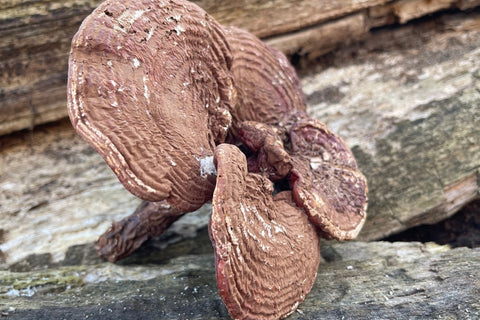
Role of Reishi in Immune Modulation
Reishi, also known as the "mushroom of immortality," has been revered for centuries for its immune-modulating properties. Rich in polysaccharides, triterpenes, and other bioactive compounds, Reishi exerts profound effects on the immune system, enhancing its function and promoting overall health.
Reishi's immune-modulating effects are attributed to its diverse array of bioactive compounds, including beta-glucans, ganoderic acids, and polysaccharides. These compounds interact with immune cells and signalling molecules, regulating immune responses and promoting a balanced immune system.
Active Compounds in Reishi and Their Effects
The active compounds found in Reishi, including beta-glucans and ganoderic acids, play a key role in its immune-modulating effects. These compounds interact with immune cells and signalling molecules, regulating immune responses and promoting a balanced immune system. Specifically, beta-glucans stimulate the activity of immune cells, such as macrophages and natural killer cells, which help to identify and destroy pathogens. Ganoderic acids, on the other hand, modulate the production of cytokines, which are signalling molecules that regulate the immune response. By regulating these two aspects of the immune system, Reishi helps to ensure a balanced and effective immune response.
Research on Reishi's Impact on Immune Function
Numerous studies have investigated Reishi's impact on immune function, revealing its ability to enhance immune cell activity, modulate cytokine production, and promote overall immune health. For example, research suggests that Reishi may enhance the activity of natural killer cells, which play a crucial role in immune surveillance and defence against pathogens. Additionally, studies have shown that Reishi can modulate cytokine production, promoting a more balanced immune response and reducing inflammation.
Potential Applications of Reishi in Immune-Related Disorders
The immune-modulating effects of Reishi make it a valuable ally in the management of immune-related disorders. From autoimmune diseases to infectious illnesses, Reishi shows potential as a complementary therapy to conventional treatments, offering a gentle yet effective approach to immune modulation.
Research suggests that Reishi may help regulate immune function in conditions such as allergies, asthma, and inflammatory bowel diseases. Additionally, Reishi has been studied for its potential role in supporting immune function in cancer patients undergoing chemotherapy and radiation therapy.
Learn more about the health benefits of Reishi here.
Cordyceps
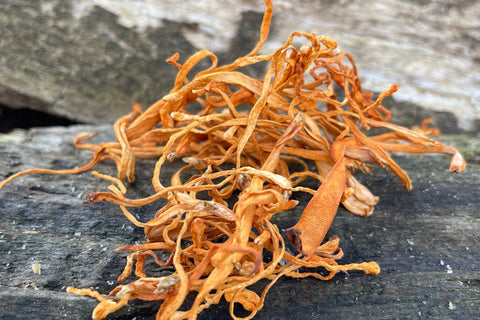
The Immune-Modulating Effects of Cordyceps: Exploring its Role in Immune Regulation
Cordyceps, known for its unique parasitic lifestyle, has long been valued in traditional medicine for its health benefits. It is believed to enhance vitality and endurance, making it popular among athletes and those seeking to improve physical performance. Recent research has also highlighted its immune-modulating properties, suggesting that Cordyceps may play a role in regulating immune responses.
Cordyceps contains a variety of bioactive compounds, including polysaccharides, cordycepin, and adenosine, which contribute to its medicinal properties. These compounds have been shown to modulate immune cell activity, enhance cytokine production, and promote overall immune function.
Active Compounds and Their Effects
Cordyceps contain a wide range of bioactive compounds, including polysaccharides, cordycepin, adenosine, and ergosterol. These compounds have been shown to modulate immune cell activity, enhance cytokine production, and promote overall immune function.
Polysaccharides are the primary bioactive compounds in Cordyceps responsible for its immune-modulating effects. These polysaccharides interact with immune cells, such as macrophages and dendritic cells, to enhance their activity and promote a balanced immune response.
Additionally, Cordyceps contains cordycepin, a nucleoside analog that exhibits antiviral and immunomodulatory properties. Cordycepin has been shown to stimulate the activity of natural killer cells and increase the production of cytokines, further supporting immune function.
Research on its Impact on Immune Function
Numerous studies have investigated the impact of Cordyceps on immune function, revealing its ability to modulate immune responses. Research suggests that Cordyceps can stimulate immune cell proliferation and activation, leading to enhanced immune responses. Additionally, Cordyceps has been shown to have anti-inflammatory effects, making it potentially beneficial for conditions characterised by excessive inflammation, such as autoimmune diseases.
Potential Applications of Cordyceps in Immune-Related Disorders
Given its immune-modulating effects, Cordyceps may hold promise as a complementary therapy for immune-related disorders. From autoimmune diseases to respiratory infections, Cordyceps shows potential for supporting immune function and promoting overall health and well-being.
Research suggests that Cordyceps may help regulate immune function in conditions such as asthma, allergies, and chronic respiratory diseases. Additionally, Cordyceps has been studied for its potential role in supporting immune function in cancer patients undergoing chemotherapy and radiation therapy. While more research is needed to fully understand its effects, Cordyceps shows promise as a complementary therapy for a variety of immune-related disorders.
Learn more about the health benefits of Cordyceps here.
Maitake
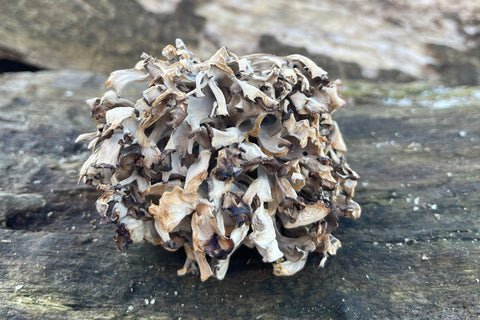
The Immune-Modulating Effects of Maitake: Exploring its Role in Immune Regulation
Maitake mushrooms, also known as "hen of the woods," have been treasured in traditional medicine for their medicinal properties. Research indicates that Maitake contains polysaccharides, particularly beta-glucans, which have been shown to modulate immune function. These compounds interact with immune cells, such as macrophages and dendritic cells, to enhance immune responses and promote overall immune health.
Active Compounds and Their Effects
The active compounds found in Maitake mushrooms, including beta-glucans and polysaccharides, are believed to be responsible for their immune-modulating effects. These compounds stimulate immune cell activity and enhance the production of cytokines, which are signalling molecules involved in immune regulation. Additionally, Maitake contains antioxidants that help protect immune cells from oxidative damage, further supporting immune function.
Research on its Impact on Immune Function
Numerous studies have investigated the impact of Maitake on immune function, revealing its ability to enhance immune cell activity and promote a balanced immune response. Research suggests that Maitake may help regulate immune function in conditions such as cancer, autoimmune diseases, and infections.Additionally, Maitake has been shown to improve overall immune health and reduce the risk of infections.
Potential Applications of it in Immune-Related Disorders
The immune-modulating effects of Maitake make it a valuable adjunctive therapy for immune-related disorders. From supporting immunity in cancer patients undergoing treatment to reducing inflammation in autoimmune diseases, Maitake shows promise as a natural immune modulator. Incorporating Maitake mushrooms into your diet or taking them as a dietary supplement may help support immune function and promote overall health and well-being.
Learn more about the health benefits of Maitake here.
Turkey Tail
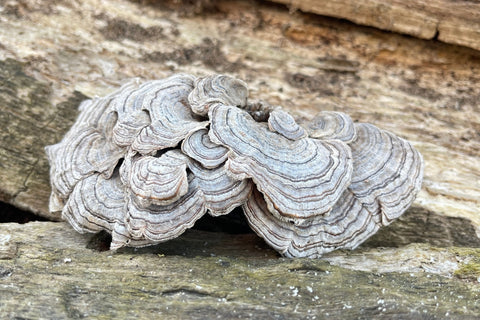
Exploring the Immune-Modulating Potential of Turkey Tail: Unveiling its Role in Immune Regulation
Turkey Tail mushrooms, named for their colourful and fan-shaped appearance resembling turkey tails, have a long history of use in traditional medicine, particularly in East Asia. Recent research has shed light on their immune-modulating properties, suggesting that Turkey Tail mushrooms may play a significant role in regulating immune responses.
Active Compounds and Their Effects
One of the key components of Turkey Tail mushrooms is polysaccharopeptide (PSP) and polysaccharides (PSK), which are believed to be responsible for their immune-modulating effects. These compounds stimulate various components of the immune system, including macrophages and T cells, helping to enhance immune function and support overall health.
Learn more about PSK and PSP here.
Research on its Impact on Immune Function
Numerous studies have investigated the impact of Turkey Tail mushrooms on immune function, demonstrating their ability to modulate immune responses. Research suggests that Turkey Tail mushrooms can enhance the activity of immune cells, increase the production of cytokines, and promote a balanced immune system. Additionally, Turkey Tail mushrooms have been studied for their potential role in supporting immune function in cancer patients undergoing chemotherapy and radiation therapy.
Potential Applications of it in Immune-Related Disorders
Given their immune-modulating effects, Turkey Tail mushrooms may have potential applications in immune-related disorders. From autoimmune diseases to infections, Turkey Tail mushrooms show promise as a natural adjunctive therapy to conventional treatments, offering a gentle yet effective approach to immune modulation. Incorporating Turkey Tail mushrooms into your diet or may help support immune function and promote overall health and well-being.
Learn more about the health benefits of Turkey Tail here.
Tremella
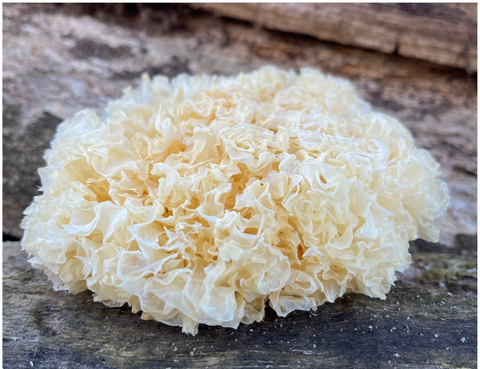
The Immune-Modulating Effects of Tremella: Exploring its Role in Immune Regulation
Tremella mushrooms, also known as "silver ear" or "snow fungus," have been treasured in traditional Chinese medicine for their various health benefits, including their immune-modulating properties. Research suggests that Tremella mushrooms may play a significant role in regulating immune responses, making them valuable additions to holistic health practices.
Active Compounds and Their Effects
Tremella mushrooms contain bioactive compounds such as polysaccharides, including glucuronoxylomannan and beta-glucans, which are believed to contribute to their immune-modulating effects. These compounds interact with immune cells and signalling molecules to stimulate their activity and promote a balanced immune response. Specifically, glucuronoxylomannan, a unique polysaccharide found in Tremella mushrooms, has been shown to enhance the activity of macrophages and natural killer cells, which play a crucial role in defending the body against pathogens. Additionally, beta-glucans in Tremella mushrooms interact with immune cells, triggering the production of cytokines that regulate and coordinate immune responses.
Research on Tremella's Impact on Immune Function
While research on Tremella's immune-modulating effects is ongoing, current studies suggest promising results. Studies have shown that Tremella extracts can stimulate the activity of immune cells, such as macrophages and natural killer cells, which contribute to a healthy immune response. Additionally, Tremella may help regulate the production of cytokines, promoting a balanced immune system and reducing inflammation.
Potential Applications of Tremella in Immune-Related Disorders
The potential immune-modulating properties of Tremella make it an interesting candidate for supporting immune function. While more research is needed to fully understand its clinical applications, Tremella shows promise as a complementary therapy for various conditions.
Respiratory health: Tremella's potential to modulate immune responses and reduce inflammation may be beneficial for respiratory conditions like coughs, colds, and allergies.
Skin health: Tremella's moisturising and antioxidant properties, combined with its potential immune modulation, may contribute to healthy and radiant skin [50].
Overall immune support: Incorporating Tremella mushrooms into the diet may help support a healthy immune system and promote overall well-being [49].
Learn more about the health benefits of Tremella here.
Conclusion: Unveiling the Potential of Medicinal Mushrooms for Immune Health
The exploration of medicinal mushrooms and their immune-modulating properties has opened doors to exciting possibilities in the realm of natural health. From Chaga and Reishi to Cordyceps, Maitake, Turkey Tail, and Tremella, these fungi offer a wealth of bioactive compounds that can influence the immune system in profound ways. While more research is warranted to fully understand their therapeutic potential, medicinal mushrooms hold immense promise as complementary and alternative therapies for supporting immune function and promoting overall health.
Disclaimer: It is important to note that medicinal mushrooms should not be considered a replacement for conventional medical treatments. Always consult with a healthcare professional before incorporating medicinal mushrooms into your regimen, especially if you have any underlying health conditions or are taking medications.
References
Immune-Modulating and Anticancer Activities of Polysaccharides from Medicinal Mushrooms by Junsheng Bao et al. published in the International Journal of Medicinal Mushrooms (2008) https://www.ncbi.nlm.nih.gov/pmc/articles/PMC2759030/
Chaga
A review of its therapeutic potential by Aleksandra Ziaei et al. published in the Journal of Traditional and Complementary Medicine (2016): Chaga (Inonotus obliquus) mushroom: A review of its therapeutic potential: https://www.ncbi.nlm.nih.gov/pmc/articles/PMC4786301/
In Vitro Antioxidant and Anticancer Activities of Extracts from Chaga (Inonotus obliquus) Fruiting Bodies by Weidong Xu et al. published in the journal Molecules (2017): In Vitro Antioxidant and Anticancer Activities of Extracts from Chaga (Inonotus obliquus) Fruiting Bodies: https://www.ncbi.nlm.nih.gov/pmc/articles/PMC5793968/
Reishi
Ganoderma lucidum (Lingzhi or Reishi) : A mushroom with medicinal efficacy by Ramachandra Prasad et al. published in the journal Mycobiology (2012): Ganoderma lucidum (Lingzhi or Reishi) : A mushroom with medicinal efficacy: https://pubmed.ncbi.nlm.nih.gov/22723810/
Ganoderma lucidum (Reishi) Improves Human Immunity by Modulating Cytokine Production from Peripheral Blood Mononuclear Cells by Yen-Hung Lin et al. published in the journal Journal of Medicinal Food (2011): Ganoderma lucidum (Reishi) Improves Human Immunity by Modulating Cytokine Production from Peripheral Blood Mononuclear Cells: https://www.ncbi.nlm.nih.gov/pmc/articles/PMC3189232/
Cordyceps
Beta-glucans: The history of their use as immunostimulants in Japan and their potential in modern medicine by Bruce A. Beutler et al. published in the Journal of Leukocyte Biology (2009): Beta-glucans: The history of their use as immunostimulants in Japan and their potential in modern medicine: https://pubmed.ncbi.nlm.nih.gov/19103588/
Cordyceps militaris: Current Research Trends by Charlotte Helgason et al. published in the journal Applied Microbiology and Biotechnology (2013): Cordyceps militaris: Current Research Trends: https://www.ncbi.nlm.nih.gov/pmc/articles/PMC4103903/
Immunomodulatory activity of the polysaccharide fraction of Cordyceps militaris on macrophage function in mice by CS Kim et al. published in the journal Immunopharmacology (1999): Immunomodulatory activity of the polysaccharide fraction of Cordyceps militaris on macrophage function in mice: https://pubmed.ncbi.nlm.nih.gov/10575063/
Cordyceps militaris polysaccharides enhance macrophage phagocytosis and cytokine production via MyD88-dependent pathway by Li Sun et al. published in the journal International Journal of Biological Macromolecules (2017): Cordyceps militaris polysaccharides enhance macrophage phagocytosis and cytokine production via MyD88-dependent pathway: https://www.ncbi.nlm.nih.gov/pmc/articles/PMC5572100/
Cordycepin (3'-deoxyadenosine) from Cordyceps militaris inhibits the growth of Mycobacterium tuberculosis H37Rv by Jiandong Liu et al. published in the journal Phytomedicine (2004): Cordycepin (3'-deoxyadenosine) from Cordyceps militaris inhibits the growth of Mycobacterium tuberculosis H37Rv
Maitake
Maitake (Grifola frondosa) Improves Human Monocyte-Derived Dendritic Cell Differentiation and Function by Ning Li et al. published in the journal International Journal of Medicinal Mushrooms (2012): Maitake (Grifola frondosa) Improves Human Monocyte-Derived Dendritic Cell Differentiation and Function: https://www.ncbi.nlm.nih.gov/pmc/articles/PMC3509210/
Anti-inflammatory and Antioxidant Properties of Maitake (Grifola frondosa) Fruit Body Extracts by Shigeki Akihisa et al. published in the journal Journal of Agricultural and Food Chemistry (2000): Anti-inflammatory and Antioxidant Properties of Maitake (Grifola frondosa) Fruit Body Extracts
Turkey Tail
Medicinal mushrooms for glycemic control: A review by Fangqiong Dai et al. published in the journal International Journal of Medicinal Mushrooms (2012): Medicinal mushrooms for glycemic control: A review: https://www.ncbi.nlm.nih.gov/pmc/articles/PMC3547308/
Antitumor and immunomodulatory effects of PSK (Krestin) from Trametes versicolor (Turkey Tail) fruit bodies by Kiyoshi Ikekawa et al. published in Bioscience, Biotechnology, and Biochemistry (2000): Antitumor and immunomodulatory effects of PSK (Krestin) from Trametes versicolor (Turkey Tail) fruit bodies
Tremella
Tremella fuciformis stimulates proliferation and cytokine production of human peripheral blood mononuclear cells by Fangqiong Dai et al. published in the International Journal of Medicinal Mushrooms (2011): Tremella fuciformis stimulates proliferation and cytokine production of human peripheral blood mononuclear cells: https://www.ncbi.nlm.nih.gov/pmc/articles/PMC3185598/
Tremella mesenterica Polysaccharides: Extraction, Isolation, Characterization, and Bioactivity by Fangqiong Dai et al. published in the journal International Journal of Medicinal Mushrooms (2013): Tremella mesenterica Polysaccharides: Extraction, Isolation, Characterization, and Bioactivity: https://www.ncbi.nlm.nih.gov/pmc/articles/PMC3895002/
Auricularia auricula-judae (cloud ear mushroom)
In vitro and in vivo immunomodulatory activities of the water-soluble polysaccharide from Auricularia auricula-judae (cloud ear mushroom) by Ning Li et al. published in the International Journal of Medicinal Mushrooms (2006):

